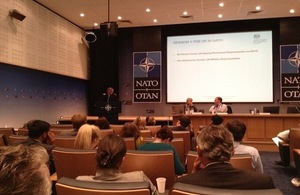UK delegation runs second successful course about understanding NATO
The course at NATO HQ in Brussels was an opportunity for UK civil servants to learn more about working with NATO.

Understanding and working with NATO session underway
On 19-20 September staff from across Whitehall and posts met at NATO HQ in Brussels for the UK Joint Delegation to NATO’s second course on Understanding and Working with NATO.
The course, which first took place in March this year, is designed to give a thorough introduction to NATO and an understanding of its place at the heart of the UK’s defence.
Course convenor Mel McNulty, head of politics and communications at UKDel said the course was designed both to increase understanding of NATO, and to encourage colleagues to factor NATO into their work, whether they were in London, a NATO capital or a partner country.
With NATO squarely at the heart of UK defence, we’re keen to ensure that the Alliance is widely understood, not only by the press and public but also within Government.
The response to our course has shown there is a gap to fill and a huge appetite among London colleagues, and in NATO ally and partner capitals, to understand NATO better.
Course participants were treated to a packed agenda. It opened in the British Residence in central Brussels where Dr Jamie Shea, former NATO spokesperson and current deputy assistant secretary general for emerging security challenges, spoke charismatically and candidly about NATO’s achievements and future challenges.
The following day, participants made their way to NATO HQ where they were briefed on the UK’s role within NATO by the Delegation’s deputy permanent representative, Patrick Turner and the UK’s military representative, Vice Admiral Ian Corder.
Other issues discussed in the morning session included the role of NATO partnerships, the NATO enlargement process and Allied perspectives on current NATO operations, including in Afghanistan, Kosovo and Operation Ocean Shield off the Horn of Africa.
An interesting discussion was held in the afternoon on the future of NATO, where a distinguished panel, including the deputy permanent representatives of the US and French Delegations, discussed the role of the Alliance after the drawdown of NATO operations in Afghanistan post-2014.
However for many the highlight of the day was the simulated North Atlantic Council (NAC). The NAC is the highest decision making body within NATO. It provides a forum for discussion and agreement amongst Allies and is chaired by the secretary general of NATO.
Course participants were assigned a country which they had to represent and were presented with a ‘crisis’ which they had to solve. As well as allowing the participants to represent their given country in NATO’s council room, the session gave an insight into how NAC sessions are organised and how Allies reach consensus during times of crisis.
Eleanor Spizewski, from the FCO’s Security Policy Department, found the mock NAC exercise particularly useful.
I particularly enjoyed taking part in the mock NAC exercise, helpfully guided by staff from UKDel on how best to negotiate a position. It was a very practical way of explaining how the NAC worked and decisions were reached.
Though it was a long day, each session was well timed and I gained more understanding of the internal and external views of NATO. I think I can safely say I learned something new from each session.
Lt Col Simon Macrory-Tinning from the UK Delegation to the OSCE thought that the course represented time well spent.
The course provided fascinating insights into NATO’s current and future issues, with excellent speakers that provided a range of insights on the political, military and resource challenges ahead.
It would be useful for anyone interested in NATO; I’ve been in the military 28 years and seconded to the FCO for nearly two, but I learned a great deal.
Julie Uzupris from the UK Permanent Representation to the EU thought that the course provided a range of perspectives which would help when working in a multilateral environment.
The sessions on the national approaches of key Allies at operational and Deputies level enabled me to better understand areas of common interest and potential for divergence. As a result I expect to improve my ability to build consensus and shape my policy approach in a complex multilateral policy environment. The course was high protein, slick and professionally delivered. I have already recommended it to colleagues!
UKDel’s understanding and working with NATO course will take place again next year.
Follow the UK Joint Delegation to NATO on twitter @UKNATO